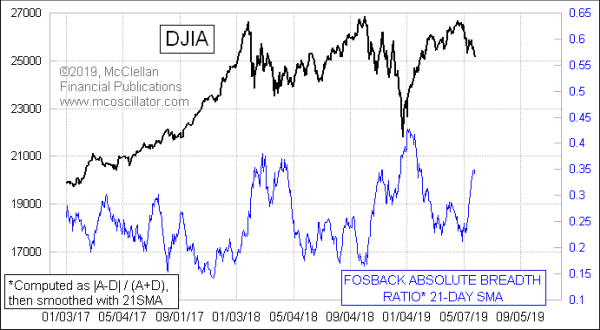Fosback Absolute Breadth, An Old Indicator That is Still Useful

Free Chart In Focus email
Delivered to you every week
Years ago, market analyst Norm Fosback came up with his 21-day Absolute Breadth Ratio, which looks at the absolute value of the daily Advance-Decline (A-D) difference, and normalizes it by dividing by the sum of Advances plus Declines (A+D). He also then smoothed those daily numbers with a 21-day simple moving average. Bigger daily breadth readings, regardless of which direction they are going, are a sign of chaos associated with important price bottoms. Quietness is a feature of price tops, and shows up as lower readings for this indicator.
In this way, Fosback’s indicator acts a lot like Welles Wilder’s Average True Range (ATR). When traders are feeling panicky at bottoms, we tend to see bigger intraday price ranges for the major averages. Quietness at tops shows up as lower ATR readings, which can be a “tell” that prices are topping.
This indicator has been zooming up at a rapid pace in May 2019, reflecting the chaos traders are feeling in an environment of trade battles with China, increase impeachment talk, and worries about the inverted yield curve harming the economy. This type of high reading is indicative of a bottom for prices, although as we saw in November 2018, the bottoming effort associate with such a reading can give way to a further decline, after a rest break.
For now, this indicator is up high enough to say that at least a rest break in the price decline is in order, if not a rebound into an actual new uptrend. And if that rest break leads to a low Fosback indicator reading again in a few weeks, then we can start to worry about more corrective work to be done later this summer.
Tom McClellan
Editor, The McClellan Market Report
Jul 13, 2016
Gobs of Breadth: The Haurlan Index |
Oct 09, 2015
Zweig Breadth Thrust Signal |
Aug 26, 2011
Large Absolute Breadth Numbers |